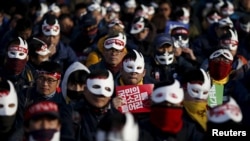Anti-government protesters marched through this city's downtown on Saturday, demanding South Korean President Park Geun-hye's apology for cracking down on a protest last month when farm and labor activists clashed with police.
Saturday's rally in the capital drew around 14,000 people, according to police estimates, far fewer than the 60,000 that attended the rally on November 14.
It went ahead after a court rejected the government's request for an injunction, made in the aftermath of the violent scenes at earlier demonstration, which had been organized by some of the country's most militant activist groups to protest Park's labor market and education policies.
Park's conservative government plans to allow employers to dismiss workers based on performance and to cap the salaries of senior employees in order to encourage employers to hire younger people and ease youth unemployment.
Activists were also protesting against Park's decision to replace privately published school history textbooks with government versions, a move they say is an attempt to whitewash military dictators' oppression of democracy and human rights in South Korea until the mid-1980s.
Charges were laid against dozens of people in the wake of the rally last month, in which riot police used water cannon and pepper spray after some protesters attacked police with metal pipes and sharpened bamboo sticks.
An arrest warrant has been issued against the head of the militant Korean Confederation of Trade Unions (KCTU), who has taken sanctuary in a Buddhist temple in Seoul. From there, on Saturday, he repeated a call for a general strike.
"What is our demand? Stop the move to worsen labor conditions that only fattens capitalists," KCTU chief Han Sang-gyun said in his video message to the rally.
KCTU has frequently issued calls for a general strike in recent years but the only significant action taken has been rotating work stoppages at locations where unionized labor is highly organized.
Park's labor policy has broad public support. A Gallup poll released in September of 1,002 respondents showed more than 70 percent support for the plan to make firing easier and to cap higher-income earners' salaries.





